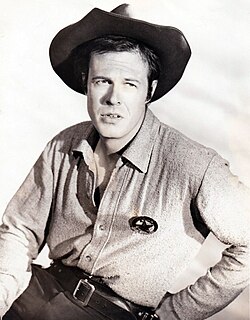Overview
Trackdown stars Robert Culp as Texas Ranger Hoby Gilman. It is set in the 1870s after the American Civil War. In early episodes, stories focused on Gilman going to different Texas towns in pursuit of wanted fugitives. At midseason, the series became set in the town of Porter, Texas. Episodes touched on multiple Western themes and topics, so it was known as "the thinking man's Western". [1] [2]
Gilman is the de facto sheriff in Porter. His friends in the town include Henrietta Porter (portrayed by Ellen Corby). She is the widow of the town's founder and owns The Porter Enterprise newspaper. His other friends included Tenner Smith (played by Peter Leeds),owner of the local saloon, Norman Leavitt as Ralph,his assistant, handyman, and de facto deputy, Occasionally, Gilman's duties as a Texas Ranger took him out of town, where he used his fast gun to "track down" and apprehend wanted criminals throughout the Lone Star State.
The pilot episode, "Badge of Honor", directed by Arthur Hiller, aired on Zane Grey Theatre on May 3, 1957. Gilman, then an ex-Confederate cavalry officer, returns to his Central Texas hometown, called "Crawford", after the war. He finds the town under the ruthless control of a gang led by an ex-Confederate colonel, Boyd Nelson (played by Gary Merrill). The once-courageous town sheriff (portrayed by Tom Tully) is now a drunken shell of a man Gilman had once known, who is afraid to face the outlaws. When a Texas Ranger came to town to arrest Colonel Nelson, he is fatally shot in the back. His Ranger badge falls on the dusty road. Gilman, who previously had served with the Texas Rangers, was weary of the Civil War and did not want to continue as a lawman, but after learning of the Ranger's death, he picks up the badge and finishes the job of bringing Nelson and his gang to justice.
Trackdown carried the endorsement of both the State of Texas and the Texas Rangers, an accolade no other Western television series has received. Some episodes were inspired by the actual files of the Rangers. [3]
Cultural references
The episode "The End of the World" received attention by certain media after Donald Trump was elected president of the United States in 2016, nearly 60 years after the episode first aired. [8] [9] [10] [11] In the episode, a rabble-rousing doomsayer named Walter Trump (played by Lawrence Dobkin) comes to town. He scares the townsfolk with talk of an impending disaster and claims to be the only person who can save them – by building a wall. He also threatens to sue Hoby when accused of dishonesty. By the end of the episode, he is arrested as a conman and fraud. The coincidental similarity to Donald Trump's name and proposed border wall was noted. [8]
A Vanity Fair author wrote, "Of all the books and movies that presaged the rise of our reality-TV President... none are so eerily on the nose as this once-obscure, 1958 episode of Trackdown in which a demagogue named Trump attempts to convince a town that only he can save its citizens... by building a wall." [9] The Wrap asked, "Want to talk about a weird coincidence?.... Some may call this episode titled 'The End of the World' the ultimate illustration of life imitating art, considering the episode aired May 9, 1958... it is pretty amusing, especially when the TV character threatens, 'Be careful, son. I can sue you.'" [10] The San Francisco Chronicle stated, "The character's speech is so similar to the President-elect's, it almost seems as if Donald Trump borrowed some catchphrases from Walter Trump." [11]
This page is based on this
Wikipedia article Text is available under the
CC BY-SA 4.0 license; additional terms may apply.
Images, videos and audio are available under their respective licenses.
